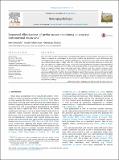Files in this item
Improved effectiveness of performance monitoring in amateur instrumental musicians
Item metadata
| dc.contributor.author | Jentzsch, Ines | |
| dc.contributor.author | Mkrtchian, Anahit | |
| dc.contributor.author | Kansal, Nayantara | |
| dc.date.accessioned | 2014-01-21T15:31:01Z | |
| dc.date.available | 2014-01-21T15:31:01Z | |
| dc.date.issued | 2014-01-01 | |
| dc.identifier | 69528456 | |
| dc.identifier | 3b9ac2a8-02c8-4c8e-bb0e-1e6b3d64c497 | |
| dc.identifier | 000330914600012 | |
| dc.identifier | 84890793299 | |
| dc.identifier.citation | Jentzsch , I , Mkrtchian , A & Kansal , N 2014 , ' Improved effectiveness of performance monitoring in amateur instrumental musicians ' , Neuropsychologia , vol. 52 , pp. 117-124 . https://doi.org/10.1016/j.neuropsychologia.2013.09.025 | en |
| dc.identifier.issn | 0028-3932 | |
| dc.identifier.other | ORCID: /0000-0001-5621-1024/work/64360889 | |
| dc.identifier.uri | https://hdl.handle.net/10023/4409 | |
| dc.description | This research was supported by a Wellcome Trust Biomedical Vacation Scholarship to Anahit Mkrtchian and a Vacation Scholarship from the Institute for Behavioural and Neural Sciences to Nayantara Kansal. | en |
| dc.description.abstract | Here we report a cross-sectional study investigating the influence of instrumental music practice on the ability to monitor for and respond to processing conflicts and performance errors. Behavioural and electrophysiological indicators of response monitoring in amateur musicians with various skill levels were collected using simple conflict tasks. The results show that instrumental musicians are better able than non-musicians to detect conflicts and errors as indicated by systematic increases in the amplitude of the error-related negativity and the N200 with increasing levels of instrumental practice. Also, high levels of musical training were associated with more efficient and less reactive responses after experience of conflicts and errors as indicated by reduced post-error interference and post-conflict processing adjustments. Together, the present findings suggest that playing a musical instrument might improve the ability to monitor our behavior and adjust our responses effectively when needed. As these processes are amongst the first to be affected by cognitive aging, our evidence could promote musical activity as a realistic intervention to slow or even prevent age-related decline in frontal cortex mediated executive functioning. | |
| dc.format.extent | 8 | |
| dc.format.extent | 1299621 | |
| dc.language.iso | eng | |
| dc.relation.ispartof | Neuropsychologia | en |
| dc.subject | Amateur musicians | en |
| dc.subject | Instrumental practice | en |
| dc.subject | Executive functions | en |
| dc.subject | Response monitoring | en |
| dc.subject | Conflict | en |
| dc.subject | Error-related negativity | en |
| dc.subject | RC0321 Neuroscience. Biological psychiatry. Neuropsychiatry | en |
| dc.subject | BDY | en |
| dc.subject | R2Y | en |
| dc.subject | R2C | en |
| dc.subject.lcc | RC0321 | en |
| dc.title | Improved effectiveness of performance monitoring in amateur instrumental musicians | en |
| dc.type | Journal article | en |
| dc.contributor.sponsor | The Wellcome Trust | en |
| dc.contributor.institution | University of St Andrews. School of Psychology and Neuroscience | en |
| dc.contributor.institution | University of St Andrews. Institute of Behavioural and Neural Sciences | en |
| dc.identifier.doi | https://doi.org/10.1016/j.neuropsychologia.2013.09.025 | |
| dc.description.status | Peer reviewed | en |
| dc.identifier.grantnumber | en |
This item appears in the following Collection(s)
Items in the St Andrews Research Repository are protected by copyright, with all rights reserved, unless otherwise indicated.

